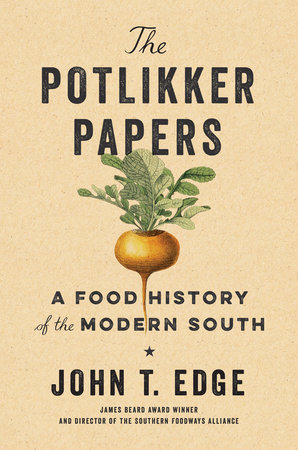|
Sam Burnham, Curator @C_SamBurnham  The Potlikker Papers, Penguin Press, 2017 The Potlikker Papers, Penguin Press, 2017 It is impossible to discuss the current state of Southern food without this book coming into the conversation. John T. Edge has given the world a volume that pulls back the curtain and reveals the ubiquitous nature of food in Southern culture. In the South, food is far more than sustenance. Certainly the intake of nutritional requirements is necessary for survival. But in the South, food is more. It is part of the social fabric. It is a method of rallying movements to a cause. Our food is one of the most significant things that separates us from the rest of the nation. Edge did some impressive research for this tome. He also covered a wide range of people and crisscrossed the South documenting different places and instances where, in their time, the South revolved around food. The key word in the subtitle is "Modern." Edge is discussing how Southern food has evolved in the 20th and early 21st centuries. He doesn't get into deep details of the French, Spanish, and, most importantly, African influences that came together in 18th century New Orleans to grant the world the blessings of Creole cuisine. You have to come into this book with a little knowledge of that history and start where he starts in this book. He starts with the Civil Rights Movement. I was fairly knowledgeable about Paschal's, the Atlanta restaurant that was so important to the work done by MLK and his team. But Edge bypassed this Atlanta landmark completely and went straight to the Montgomery bus boycotts, right to the beginning. He dropped us right in Georgia Gilmore's kitchen to see how that movement was fueled. The reader can feel the heat radiating off the stove, smell the ingredients simmering in pots, hear the clanging of spoons and pans, and here the voices of conversation as plans were made. There are stories from segregated restaurants and lunch counters and the struggle to integrate them. We see the indignity suffered by the protesters, the violence and the way white society fought back. We see black workers in white restaurants who were overworked, underpaid, and undervalued. We see many of these workers try to strike out on their own with varying degrees of success and resistance. Edge moves on to show Hippie communes, the impact of Southern cuisine on American fast food and fast casual restaurants, and how Southern food has become a national craze. One of my favorite parts of the entire book was the work of Fannie Lou Hamer, who organized farming co-ops for black farmers. Her work had the potential to build agricultural communities for blacks in the South. By owning the land they were working, they had a chance at independence, a chance to make their own future out from under the foot of discrimination. It may have been a movement ahead of its time. It's just one of several stories that leave the reader frustrated about the past but that also left me with some hope for the future. Throughout the book you see the influence race played in food. Food is like anything else in the South. You can't have a real conversation about it without at least considering race because race is a topic that touches every area of Southern life. But that isn't all bad. Through the book you see blacks get their due for their role in Southern food. From methods, to ingredients, to labor the African influence is highlighted. Without that influence there is no Southern cuisine, no Southern culture. My one disappointment with the book is that Edge shows us the African influences and he shows us the bourgeois Old South way that white restaurants often portrayed the food in their restaurants and clubs. So we see the rich whites and the poor blacks but the one group that seems to have been overlooked was the poorer whites. I would have liked to see more about the influence that Hillbillies of Appalachia, the Crackers of South Georgia and Florida, as well as other poor whites across the South who eked out a survival on vernacular ingredients and methods. It leaves me curious about the influence of people who lived on farms on steep ridges, in snug valleys, or near marshy wetlands far from large plantations where they rarely, if ever, came in contact with slaves or slaveholders. Had I read this book earlier, I probably would have enjoyed it more. I think the acclaim that it has gotten over the past year may have inflated my expectations. That is not to say that this is not an important work or that it is not recommended for anyone who wants to understand Southern food. It is a must read and makes an excellent introduction to the work that Edge is doing with the Southern Foodways Alliance. and my few reservations are in no way a condemnation of the book. I expected more but I received plenty.
0 Comments
Leave a Reply. |
Sam B.Historian, self-proclaimed gentleman, agrarian-at-heart, & curator extraordinaire Social MediaCategories
All
Archives
November 2022
|




 RSS Feed
RSS Feed
